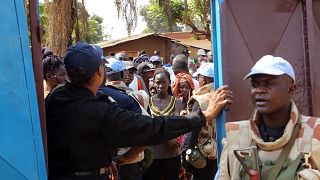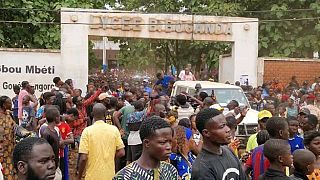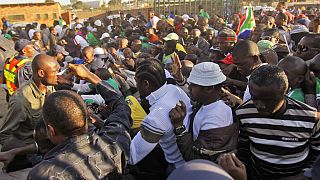Central African Republic
People in Bangui, capital of the Central African Republic were collecting their voter cards Thursday, despite the doubts that linger about the holding of presidential and parliamentary elections on Sunday.
Sunday's presidential and legislative elections are deemed a key test of the strife-torn country's ability to recover stability.
President Faustin-Archange Touadera, 63, is considered is widely expected to secure re-election after the CAR's top court barred ex-president Francois Bozize, who is on a 2014 wanted list and under UN sanctions, from standing.
The nearest rival in the 16-strong field is Anicet Georges Dologuele, an economist and former prime minister who is being backed by Bozize after his own bid fell through.
On Thursday, the rebels said they would observe a unilateral ceasefire in the run-up to the elections.
Election authorities and the UN mission in the country have said that the vote will go ahead as scheduled.
But a crucial question is whether turnout will be badly affected by violence or intimidation, denting the credibility of the next president and 140-seat legislature.
Mineral-rich but rated the world's second-poorest country on the Human Development Index, the CAR has been chronically unstable since independence 60 years ago.
A civil war erupted in March 2013 when mostly Muslim rebels in a coalition called Seleka stormed the capital and removed Bozize, a Christian and former general who had seized power a decade earlier.
Other groups, notably Christians and animists, then organized their own militias, prompting fears of genocide along sectarian lines.
France sent in some 2,000 soldiers under a UN mandate.
In 2014, the UN sent its own mission, MINUSCA, and in 2016 elections were held, won by Touadera, a technocrat educated in France and Cameroon.
Voters in the Central African Republic 🇨🇫 are gearing up for elections on 27 Dec, which will determine who will lead their country and represent them in parliament. Peaceful, credible and inclusive elections are critical for the country in this moment in history. #ElectionsRCA pic.twitter.com/WEC2R0bjbz
— UN Peacekeeping (@UNPeacekeeping) December 24, 2020
Since 2013, thousands of people have died and more than a quarter of the population of 4.9 million have fled their homes.













11:19
Cocoa is under pressure while East African economy is on the rise {Business Africa}
01:21
Cameroon 2025: Maurice Kamto seeks to vie on a different political outlook
01:52
Togo’s security forces cast early votes ahead of high-stakes municipal elections
02:35
Central African Republic's major rebel groups to disarm, dissolve
Go to video
Togo suspends French state-owned broadcasters RFI and France 24